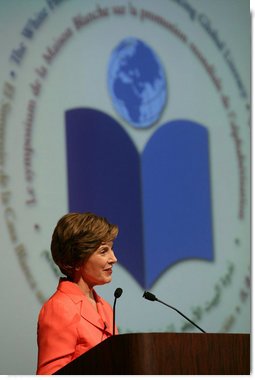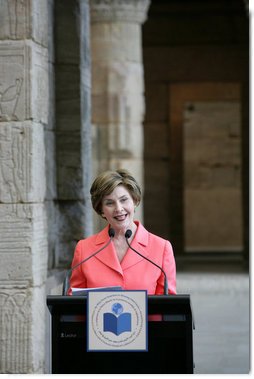|
Home >
News & Policies >
September 2008
|
For Immediate Release
Office of the First Lady
September 22, 2008
Mrs. Bush's Remarks at the White House Symposium on Advancing Global Literacy: Building a Foundation for Freedom
Metropolitan Museum of Art
New York, New York
10:48 A.M. EDT
MRS. BUSH: Hello, everyone. Thank you all very much. Thank you so much. I want to welcome everyone here. Please be seated.
Thank you all for coming. I want to especially thank the First Ladies from around the world who've come. Thank you so much for joining us today at this conference on global literacy. I want to also thank the ministers of education, the leaders from non-governmental organizations and the private sector, distinguished guests. Welcome to the White House Symposium on Advancing Global Literacy.
 Director General Matsuura, the Director General of UNESCO, who's the leader
-- he's our leader in this Decade of Literacy. Thank you so much for
joining us today. (Applause.)
Director General Matsuura, the Director General of UNESCO, who's the leader
-- he's our leader in this Decade of Literacy. Thank you so much for
joining us today. (Applause.)
We gather today united by one common purpose, and that is to improve lives by increasing literacy around the world. We know that literacy is at the core of sustainable solutions to the world's greatest problems. Literacy builds the foundation for freedom from poverty, freedom from disease, and freedom from oppression. Worldwide, more than 770 million adults live without literacy skills. Helping each one of these men and women learn to read is our moral obligation -- and one of the greatest challenges of our time.
Literacy builds a foundation for freedom from poverty. One institution making this connection is Afghanistan's National Literacy Center. Its Learning for Community Empowerment Program combines literacy education with lessons in entrepreneurship and business skills. The program aims to serve 300,000 people over the next five years -- and 60 percent of these learners will be women. For the first time, they'll be taught to read and taught the skills they need to find jobs and support their families.
Literacy builds a foundation for freedom from disease. Jennifer Chiwela, Executive Director of the People's Action Forum, has seen the link between literacy and good health. Her organization trains caregivers and builds awareness of HIV/AIDS in Zambia. Jennifer soon realized that the People's Action Forum's efforts in rural communities depended on improved education. She saw that people who could not read could not follow their doctors' instructions or understand the labels on a prescription bottle. They had trouble keeping track of their pills for their treatment and understanding information about nutritious foods.
In response, the People's Action Forum launched "REFLECT and HIV/AIDS." Participants learn literacy and numeracy skills as they discuss strategies to reverse the spread of HIV/AIDS. As Jennifer explains, "Literacy goes beyond reading words; it helps our learners read the world."
 Literacy builds a foundation for personal and political freedom. It gives
citizens the tools they need to read an election ballot, or to read a
bedtime story to their child.
Literacy builds a foundation for personal and political freedom. It gives
citizens the tools they need to read an election ballot, or to read a
bedtime story to their child.
One mother of two, Sharon, describes her experience with illiteracy this way. She said, "There [was] no place for me at the heart of society." But Sharon found hope in the promise of education. At the age of 33, a friend introduced her to the Adult Literacy Tutors Association of Trinidad and Tobago. Sharon is now learning to read and write, and says she has "a whole new life."
Illiteracy hampers communication between rural villages and more prosperous societies, making it difficult for villagers to benefit from technological progress and other advances.
For these people especially, the United Nations Literacy Decade is spreading literacy as freedom. This year marks the halfway point for the U.N. Literacy Decade. Over the last five years, we've taken important steps to engage every nation in expanding literacy to all.
UNESCO launched the Literacy Initiative for Empowerment, or LIFE program, to promote education in countries with the highest rates of illiteracy. And the Literacy Assessment and Monitoring Program, LAMP, is helping measure our progress and identify areas of needs. You'll hear more about both of these programs that were launched by UNESCO in just a little bit from the directors.
As Honorary Ambassador of the U.N. Literacy Decade, I convened the White House Conference on Global Literacy in 2006. Since then, UNESCO has organized six regional literacy conferences. Many of you attended at least one of these gatherings. Thank you very much to the host countries for your leadership and coordination. And thanks to Director General Matsuura for facilitating these events. I look forward to learning more about the outcomes in just a few minutes.
Achieving the goal of global literacy will require global participation. Today, I'm happy to announce the establishment of the United Nations Literacy Decade Fund to Advance Global Literacy. This fund will be housed at UNESCO and sustained by contributions from governments, foundations, corporations, and others. It will support activities in the 35 countries with the lowest literacy rates, and it will target the most disadvantaged populations -- including orphans and out-of-school youth.
The United States is proud to be the first to contribute to this new fund. Today, we're committing more than $2 million to fund the advance of the cause of global literacy. We look forward to future donations from other governments and other donors worldwide.
The investment needed to combat illiteracy is large, but its returns are greater. Investing in literacy can boost an economy with higher wages, improved productivity and health, and reduce poverty and crime. It's the obligation of every government to educate its children, and I urge everyone here to make sure that all children worldwide can attend school.
Much work remains to reach the goal of expanding literacy to every man, woman, and child. Over the next five yeas, we must seek creative solutions for reaching those who cannot be reached through traditional literacy efforts. Many corporations are already involved in promoting the Literacy Decade's goals, offering free job training and developing new technologies. Governments, non-profits, foundations, and corporations must look for new way to partner to promote literacy within the framework of our global economy.
I've seen the hope that literacy brings to people around the world, and I look forward to promoting literacy education for years to come. From women entrepreneurs in Afghanistan to students in rural Zambia, literacy gives every person the freedom to achieve their full potential.
The men and women who do not read today can be the doctors, the entrepreneurs, and the teachers of tomorrow. The decision is ours to make. Today, we renew our commitment to education for all.
Thank you. (Applause.)
END 10:57 A.M. EDT


